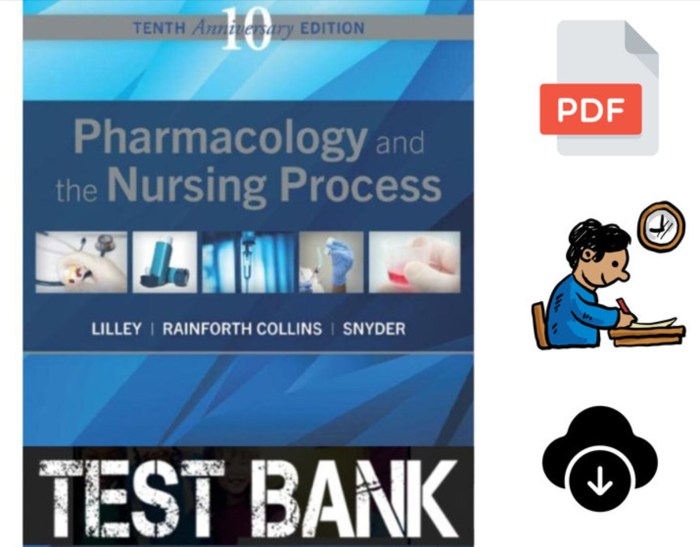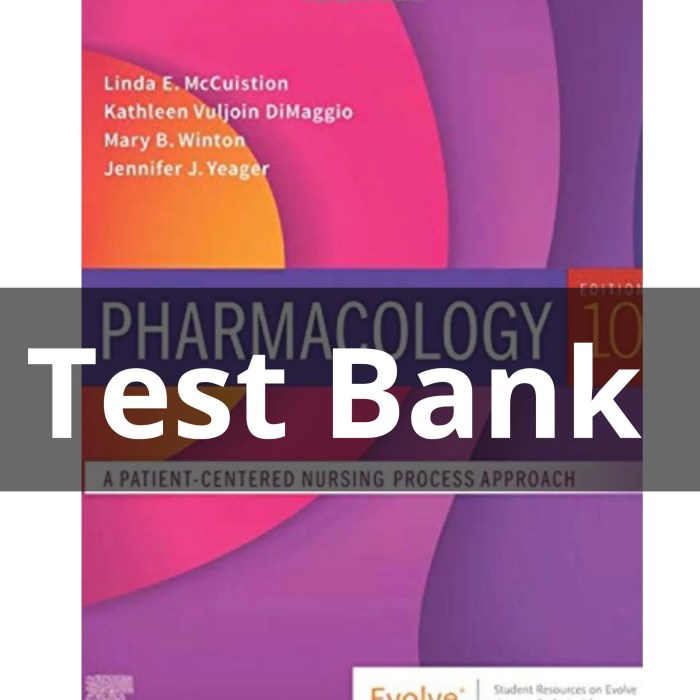Pharmacology and the nursing process 10th edition test bank – Welcome to the realm of pharmacology and the nursing process, where the 10th edition of our test bank awaits you. Embark on a journey that unveils the intricacies of drug administration, safety, interactions, and side effects, equipping you with the knowledge and skills to navigate the complexities of pharmacology in nursing practice.
As nurses, we stand at the forefront of patient care, where understanding pharmacology is paramount. This test bank serves as an indispensable resource, guiding you through the different phases of the nursing process, ensuring that pharmacology is seamlessly integrated into your practice.
Overview of Pharmacology and the Nursing Process

Pharmacology is the study of drugs and their effects on the human body. It is an essential component of nursing practice, as nurses must have a thorough understanding of pharmacology in order to safely and effectively administer medications to patients.
The nursing process is a systematic approach to patient care that consists of five phases: assessment, diagnosis, planning, implementation, and evaluation. Pharmacology is integrated into each phase of the nursing process. During the assessment phase, nurses collect information about the patient’s medical history, current medications, and allergies.
This information is used to develop a nursing diagnosis, which is a statement about the patient’s health problem. During the planning phase, nurses develop a plan of care that includes the medications that will be administered to the patient. During the implementation phase, nurses administer the medications and monitor the patient for any adverse effects.
During the evaluation phase, nurses assess the patient’s response to the medications and make any necessary adjustments to the plan of care.
Drug Administration and Safety
There are many different routes of drug administration, including oral, intravenous, intramuscular, and subcutaneous. The route of administration is chosen based on the type of medication, the patient’s condition, and the desired effect. Nurses must be familiar with the different routes of administration and the principles of safe drug administration in order to ensure that medications are administered safely and effectively.
Drug Interactions and Side Effects
Drug interactions can occur when two or more drugs are taken together. These interactions can be harmful, so it is important for nurses to be aware of the potential risks. Side effects are unwanted effects that can occur when a medication is taken.
Nurses must be familiar with the potential side effects of medications and how to manage them.
Nursing Considerations for Specific Drug Classes, Pharmacology and the nursing process 10th edition test bank
There are many different classes of drugs, including antibiotics, analgesics, and cardiovascular drugs. Nurses must be familiar with the nursing considerations for each drug class, including the potential side effects, monitoring parameters, and patient education.
Questions Often Asked: Pharmacology And The Nursing Process 10th Edition Test Bank
What is the significance of pharmacology in nursing?
Pharmacology empowers nurses to understand the mechanisms of drugs, their effects on the human body, and their role in treating and preventing diseases.
How does the nursing process incorporate pharmacology?
Pharmacology is integrated into each phase of the nursing process, from assessment and diagnosis to planning, implementation, and evaluation.
What are the potential risks associated with drug administration?
Drug administration carries risks such as medication errors, adverse drug reactions, and drug interactions, which can compromise patient safety.
How can nurses manage drug interactions and side effects?
Nurses play a crucial role in identifying potential drug interactions and managing side effects through careful monitoring, patient education, and collaboration with healthcare professionals.
What are the ethical and legal considerations in pharmacology?
Nurses must adhere to ethical principles such as informed consent and patient confidentiality, and they are legally responsible for ensuring the safe and appropriate use of drugs.



